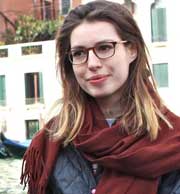
What country have you always wanted to visit?
Rosa: I love Italy, but I do often neglect the rest of Europe. I love cake, culture and wine, and Vienna has long been a dream destination of mine. Recently I have started learning German, for my doctoral work, but I have started becoming rather obsessed with the Germanic culture in all shapes and sizes.
Vienna complements my interests - for example, I love the Opera - Verdi, Puccini, Rossini, and yet I don't know much about Mozart (who lived in Vienna). It is great to expand your knowledge. Equally, the museums in Vienna are meant to be out of this world, and have art from all over the world, but also a strong collection of Viennese art - such as the Egon Shiele paintings in the Belvedere.
I find that when I really want to visit somewhere new, I spend a lot of time planning my trip, and Vienna is no exception: this summer I shall be cycling down the River Danube, through Germany, until I arrive in Vienna - where I shall reward myself heavily with Opera, Cake and Art.
What was your favorite traveling experience?
Rosa: The summer before I started university I put on a backpack, bought an interrail Train ticket, and I went around Europe on a shoestring budget. I had never studied Art History at school, and after AHA when I was 18 I bought a copy of Ernst Gombrich's 'The Story of Art' as an entry level text.
My trip around Europe was essentially a pilgrimage to many of the buildings, paintings and sculptures that are mentioned in the book. I spent three glorious months looking and reading.
I also learnt how to live by myself, and manage finances - I have a vivid memory of only having €15 to spend a day by the time I got to Amsterdam, and making the choice between pancakes and Van Gogh. I chose the Sunflowers, and remember going to bed hungry, but not caring one little bit!

What unique qualities does your company possess?
Rosa: As a former student of AHA, I feel that I have the authority to state that it is a completely inspirational experience. The tutors all truly love their subject, and their enthusiasm means that the classes are never overly formal, and definitely do not have the feel of a classic classroom where you follow & swallow a syllabus.
All lessons are taught in small groups, which allows for more of a conversation, and the lack of exams means that for the first time ever, many of the students really are experiencing the joy of learning without having to jump through hoops. Nevertheless, the level of the sessions are very high, and students can't help but be stimulated when standing next to/inside some of the more impressive monuments ever created.
The bond between students and tutors also allows for a new teaching experience - everybody spends the evenings together, and some of our most interesting conversations happen at night. 'Education' isn't limited between the hours of 9-6, it is continuous and hopefully instils a hunger for knowledge which isn't limited to Italy or Art.
What does your home-country's culture value that is taught in your program?
Rosa: That's a great question. Art History Abroad is an English company, but spends most of its time in Italy. We spend many a day basking in the glow of the Italian Renaissance, eating Gelato and talking with our hands, and yet there is something extremely British about us.
There is a rich tradition of the Grand Tour, and brits popping along to Italy to 'better' themselves, and AHA does continue that narrative to some extent. However, I think what is striking to our American students is quite how quaint all the tutors are!
We are very prompt, proper and polite, but more than that, we instinctively take the art of wit, conversation and manners very seriously, and although we never enforce our behaviour onto the students we often find that we receive praise from students' parents stating that their son/daughter has come back home and is now masterful in the art of pleasantries! My golly!